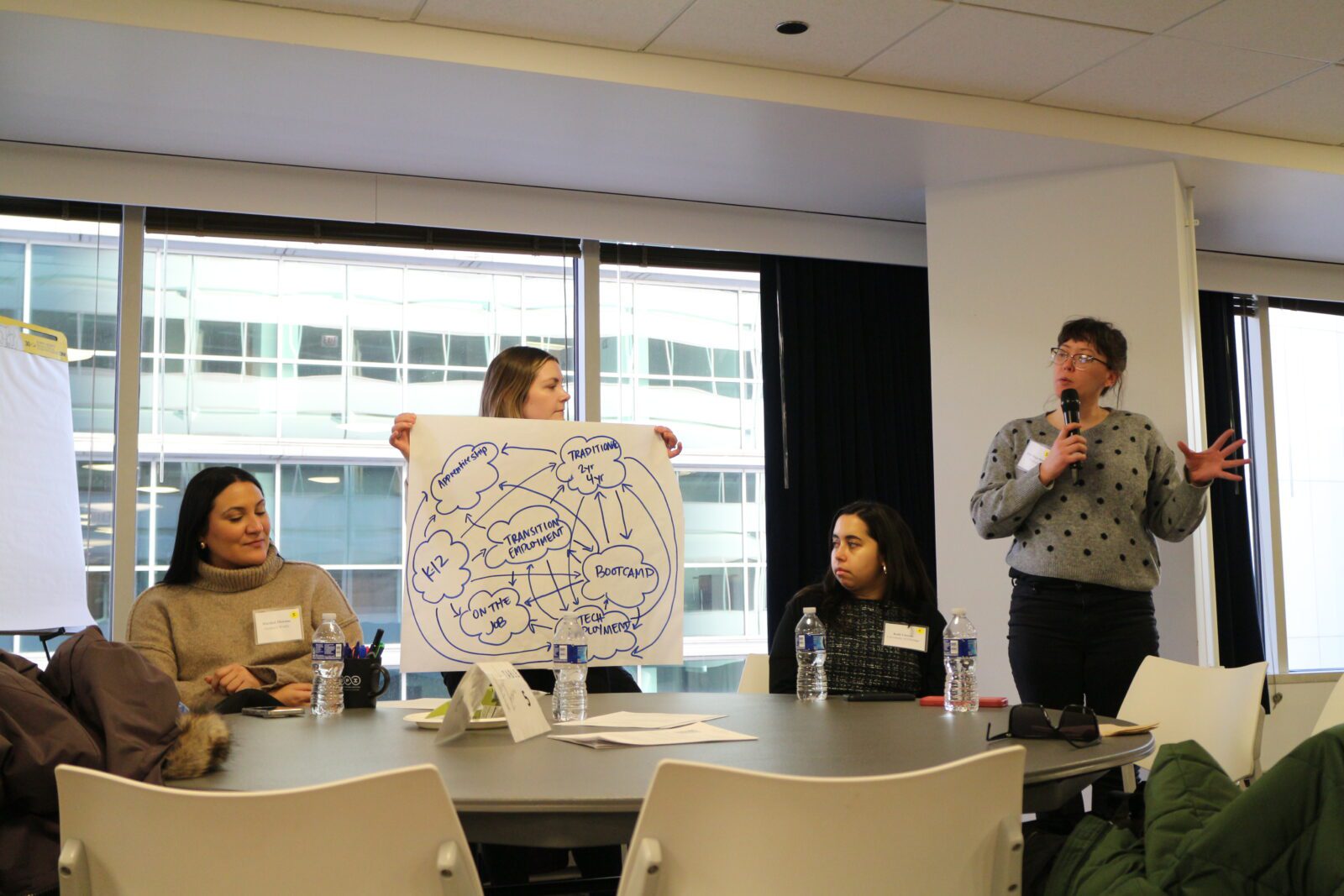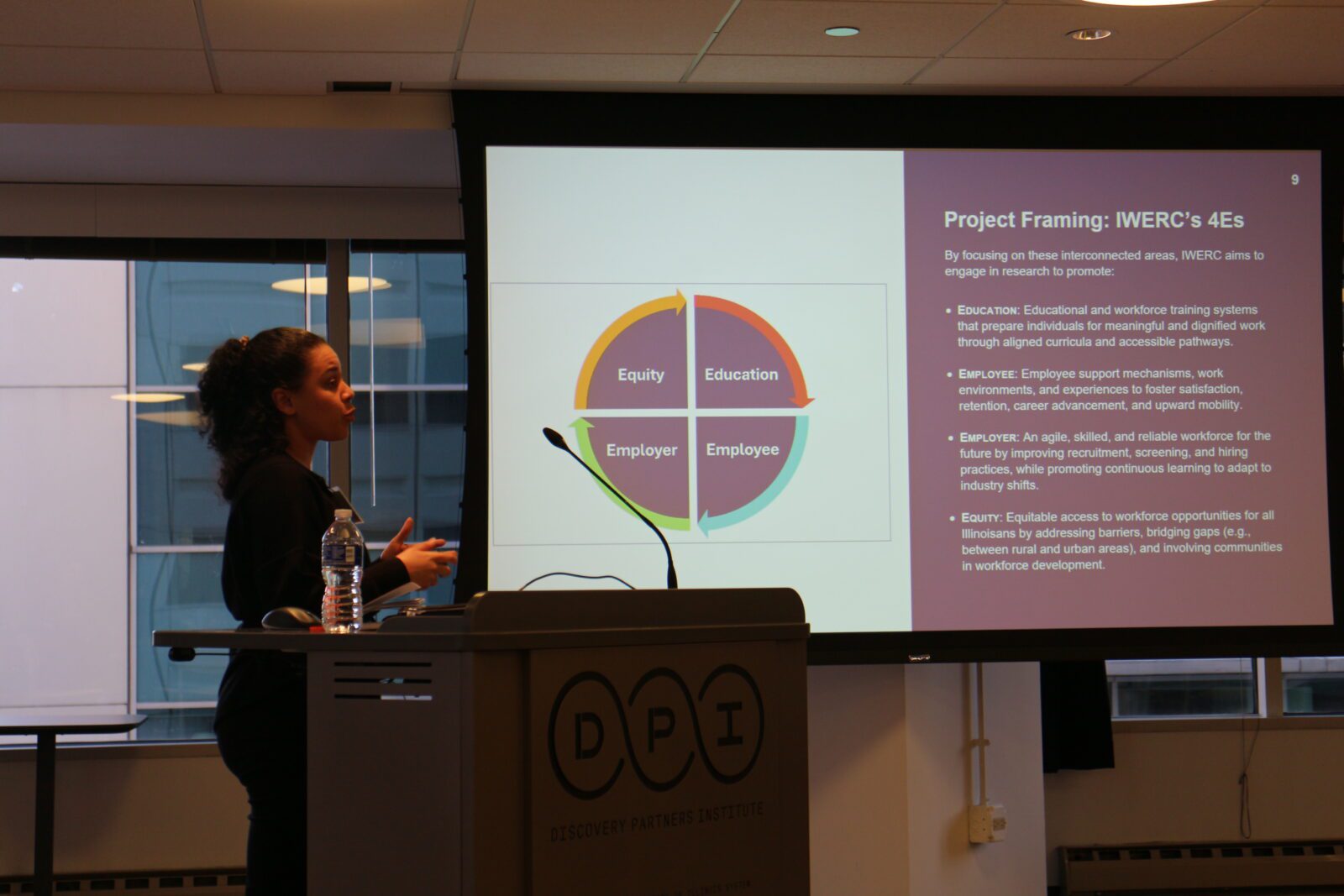 Study participants illustrate potential tech career paths.
Study participants illustrate potential tech career paths.
A new research project from the Illinois Workforce and Education Research Collaborative (IWERC) is analyzing the tech landscape in Chicago.
Supported by Bridges to Brighter Futures, the project, Mapping Chicago’s Tech Ecosystem: Training and Workforce Development, launched in February. Representatives from more than 40 organizations involved in tech training and workforce development in Chicago attended the kickoff.
The project
The tech ecosystem project will examine Chicago’s tech industry through lenses of employers, employees, education/training providers, and equity. By leveraging job posting data, a training provider survey, and insights from project participants, the final report will systematically catalog and assess non-degree adult training programs within Chicago’s tech ecosystem. This analysis will identify key features, strengths, and gaps to better align employer needs with workforce development efforts, with a particular focus on ensuring equitable access to opportunities for job seekers facing the greatest barriers to employment in the tech industry.
In addition to contributing to the research itself, the study also offers opportunities for project participants to:
- network
- share insights about their organizations
- forge new partnerships, and
- increase visibility for their programs.
Additionally, they will gain a deeper understanding of how their work fits into the broader tech ecosystem, identify potential areas for collaboration, and access valuable data and findings that can inform their strategies and decision-making.
The kickoff
At the February 13 project kickoff, participants learned about the project’s aims and activities, engaged in small and large group networking, and participated in a hands-on activity to “map” Chicago’s tech ecosystem.
Before the activity, Jasmine D. Collins, IWERC research specialist and project lead, provided a list of potential ecosystem players to spark ideas. This list included employees and job seekers, employers, funders, incubators and accelerators, intermediaries, K–12 programs, nonprofits, postsecondary education providers, workforce training providers, and other allied organizations.
In small groups intentionally organized to include a range of ecosystem roles, participants were instructed to create a visual representation of Chicago’s tech ecosystem. Through this activity, four key takeaways emerged:
1. Chicago’s tech ecosystem is complex. In their report The Chicago Tech Effect, the Chicagoland Chamber of Commerce and HR&A Advisors define an economic ecosystem as “a network of organizations that enables the provision of goods and services.” The report further explains that “Chicago’s tech ecosystem jobs are distributed throughout tech and non-tech industries and occupations, incorporating a broad range of jobs that rely on tech and require tech talent.”
Given this complexity, pinpointing who does what within the ecosystem can be a daunting task. Activity participants noted that some organizations serve multiple functions, making categorization challenging.
Additionally, even organizations within the same category — such as funders or large and small tech companies — may have differing, and at times competing, goals and priorities. These overlapping roles and divergent interests further highlight the need for coordination and alignment to ensure the ecosystem effectively supports both employers and job seekers.
2. Pathways through Chicago’s tech training landscape are not linear. Participants used various visual styles — Chutes and Ladders, concentric circles, webs, networks, and roadmaps—to illustrate how a tech career pathway involves multiple starting points, on-ramps, off-ramps, and pit stops. These various visualizations made it clear that there is no one entry point into the tech workforce.
Although early exposure at the K–12 level can be an advantage for many individuals seeking to join the tech workforce, there are multiple entry points for individuals to enter the ecosystem in hopes of receiving assistance, training, and a tech job. Participants highlighted that these entry points can come in the form of formal education, upskilling, reskilling, and on-the-job training, though questions remain regarding the quality of these opportunities and who has access to participate in them.
3. Funders play a critical role in Chicago’s tech training ecosystem. Without financial support, Chicago’s tech ecosystem would be unable to sustain itself. Participants noted that financial resources come from a variety of sources, including federal, state, and local governments, as well as private funders. However, these funders often have differing — and sometimes conflicting — priorities shaped by political and strategic agendas. Nonetheless, there was a strong consensus that funders serve as the “sunlight” to the tech ecosystem by providing a vital source of energy that keeps the ecosystem growing.
4. A human-centered approach is essential for growth. While financial resources are pivotal to the growth of Chicago’s tech ecosystem, participants were clear that humans are at the center and ultimately drive the entire system. Participants highlighted that job seekers and employees want fulfilling careers with clear opportunities for advancement. Companies, both tech and non-tech, depend on an agile, skilled workforce to ensure economic success, and as technology evolves, people remain the driving force behind economic growth. Without humans, Chicago’s tech ecosystem would not exist. For this reason, the way humans are treated and cared for within the system must remain a top priority to ensure that the entire ecosystem can remain healthy enough to support economic growth and prosperity within Chicagoland.
What’s next?
At the conclusion of the convening, participants had the opportunity to complete a questionnaire to share final thoughts and inform next steps. Many emphasized the value of networking and the need for a comprehensive directory of tech training programs. One participant expressed interest in gaining “a better understanding of the Chicago tech workforce environment and how we can better partner with organizations to grow equitable, meaningful employment opportunities.”
With these insights, IWERC looks forward to further exploring and addressing these pressing questions to strengthen Chicago’s tech ecosystem.
Throughout the spring and summer, IWERC will host virtual convenings focused on education, employers, employees, and equity. In the fall, researchers will hold a final in-person convening to recap and share key findings from the project. Through this work and ongoing community building, IWERC’s goal is to foster greater alignment and expand equitable opportunities in Chicago’s tech workforce.
For more information: Contact Jasmine D. Collins at IWERC, jdcolli2@illinois.edu.
.
 IWERC researcher Jasmine D. Collins outlines the study for participants.
IWERC researcher Jasmine D. Collins outlines the study for participants.
Author: Jasmine D. Collins